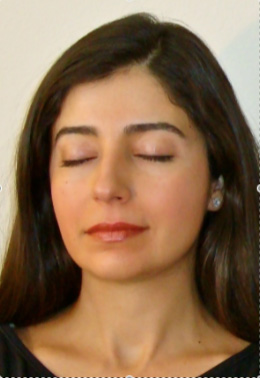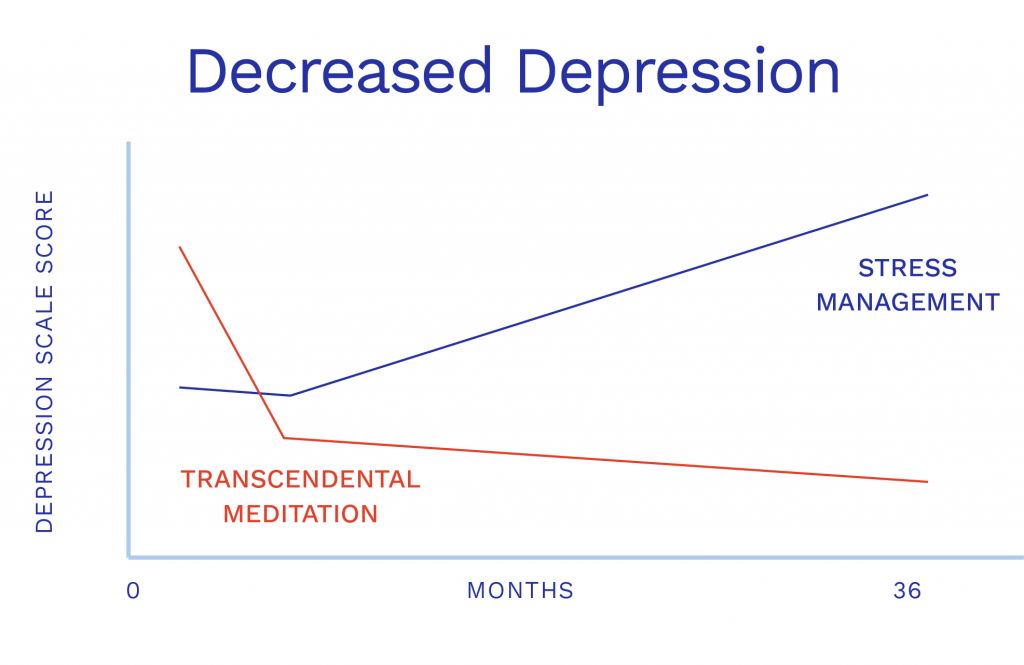Meditation for Depression

Research funded by the National Institutes of Mental Health found that people who used antidepressants had “remission rates of 31 percent after 14 weeks and 65 percent at six months” indicating that antidepressants are not effective for many people. Some antidepressant medications have a wide range of side effects including suicidal thoughts, insomnia, weight gain, restlessness, and dizziness. If you’re looking for a natural option to reduce depression, consider Transcendental Meditation.
Are you depressed?
Depression is not the same experience as when you feel down from hearing bad news. It’s a very serious emotional disorder that affects your daily life and can continue for a long time.
One out of eight women experience depression during their life. Polls in mid-December 2022 found that nearly 25 percent of women in the U.S. were feeling depressed in the past two weeks. Statistics also repeatedly indicate that women experience depression at nearly twice the rate that men do.
Symptoms of depression in women can differ from the symptoms that men experience. Everyone is unique but there are symptoms found commonly among women, including:
- Dramatic mood swings
- Insomnia
- Lack of focus
- Loss of appetite and excessive weight loss
- Reduced self-esteem
- Bouts of crying
- Hopelessness
- Mental and physical exhaustion
- Loss of interest in what used to interest you, such as family, hobbies, work, entertainment
In women, hormonal changes can promote the state of depression. Menopause, pregnancy, post-partum, and pre-menstrual cycles are famous for that phenomenon. But depression also occurs without any obvious hormonal cause.
Averting and reducing depression
Recommendations to avoid or reduce depression range from spending more time in sunlight (increasing vitamin D) increasing exercise, keeping a healthy diet, and meditating. But choosing an effective meditation is key because meditation methods and results vary widely—the way they are practiced can differ greatly and their results can range from ineffective to extremely effective.
Eliminate stress and depression
Because depression is often linked to stress, it is important to address stress as well. The Transcendental Meditation technique is the most well-researched technique for the reduction of both stress and depression. Because the technique is easy to learn and effortless to do, all women can benefit from learning it.
A meta-analysis of twenty programs of stress reduction shows that the TM technique is the most effective stress-reduction technique available. Dozens of studies published in peer-reviewed journals have found that the TM technique significantly reduces stress and makes the body resilient. Research shows that Transcendental Meditation lowers levels of cortisol (a stress hormone), decreases trait anxiety, and reduces sensitivity to stress.
One of the older studies on the TM technique, published in the Journal of Instructional Psychology in 1995, showed that university students who learned the TM technique experienced reduced depression after only three months, whereas the students who didn’t learn TM did not.
There have also been published studies showing TM increases positive self-concept and psychological health. Anxiety, Stress and Coping reported both decreased anxiety and depression. Research published in theJournal of Counseling and Development is depicted in the graph below:

The TM technique reduces the metabolic rate—the workload of the body—offering us deep rest. This profound quality of rest reduces stress while generating inner peace and contentment. The condition of depression may be associated with low levels of serotonin; researchers find that the TM practice increases serotonin in subjects whose serotonin is too low. The experience of transcending the ordinary active thinking level in the mind during TM is one of expanded happiness and fullness—the opposite of depression.
“Transcendental Meditation, Reduced Symptoms of Depression Randomized Controlled Mind-Body Intervention Trials,” a study led by researchers at the University of California Los Angeles, showed that depressive symptoms decreased by almost 50% over a 12-month period among people practicing the Transcendental Meditation technique, compared to the control group who didn’t learn the TM technique.
Not just any meditation
Don’t be fooled into thinking that one meditation technique is as good as the next. For example, techniques involving concentration can increase anxiety. Some techniques make the mind dull, some do very little. The TM program is unique in the combination of effortlessness, a wide range of benefits, and how extensively scientific research has endorsed it.
Depressed? Time to learn something new.
Connect with a Local Certified TM Teacher
About the Author
Janet Hoffman is the executive director of TM for Women Professionals, a division of TM for Women in the USA
More Posts by Janet
- A Simple Guide to Healthy Happy Mothers and Babies: An Interview with Author Margaret Mullins
- Author Ann Purcell Discusses Silence
- Five Fundamentals of Progress: A Scientific Path to Self-Improvement
- Advice You Can Rely On: How to Leverage Your Body’s Innate Healing Ability
- Saving the Ocean from Deadly Noise Pollution: An Interview with Kathy Matara PhD





